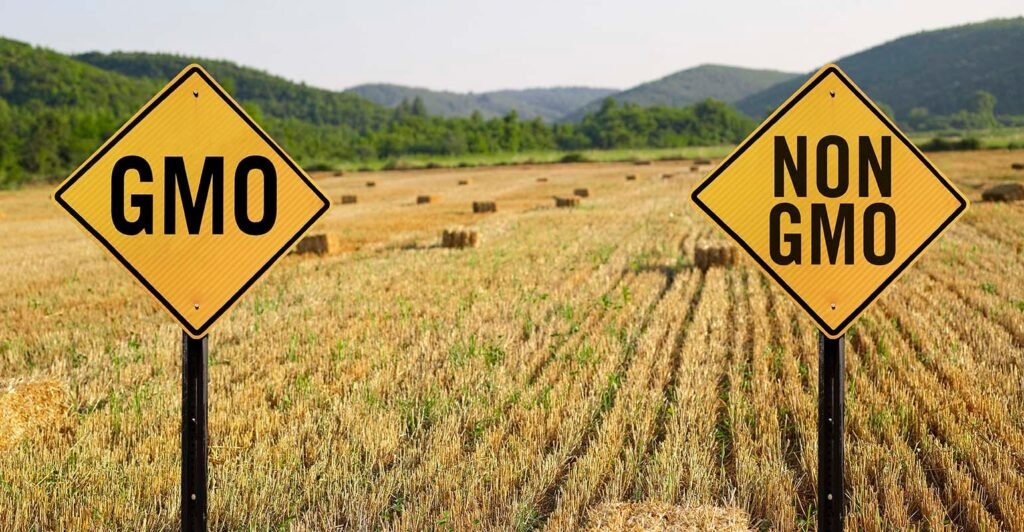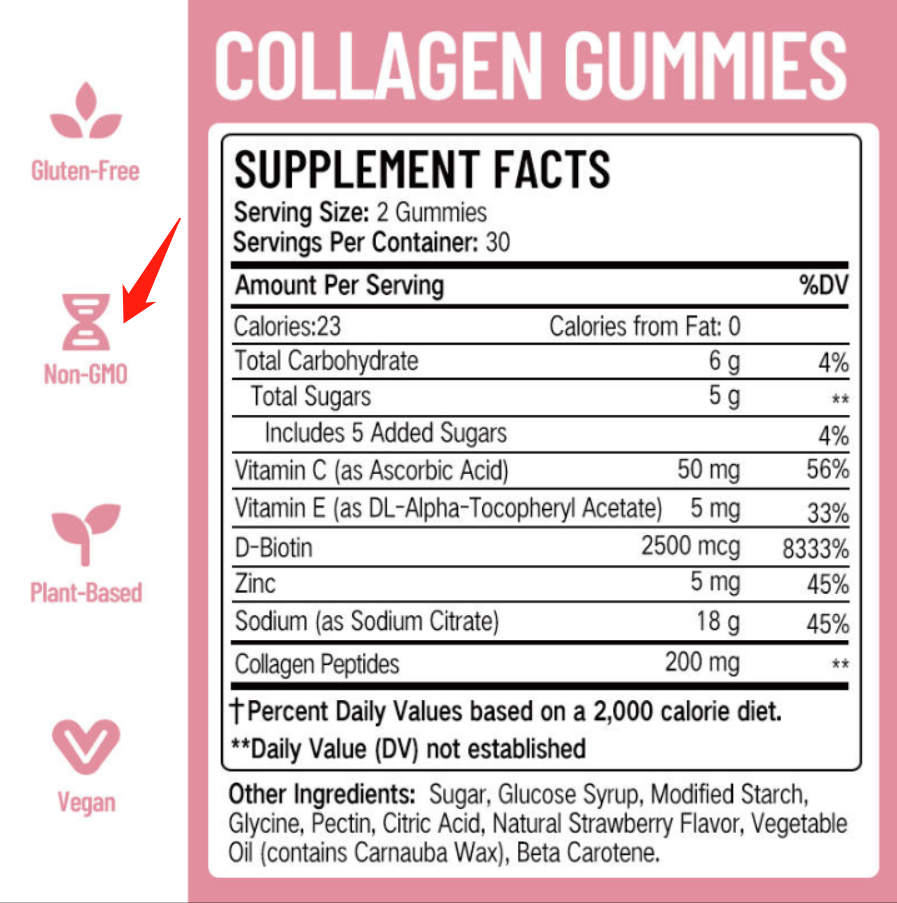In recent years, the demand for non-GMO (Genetically Modified Organism) products has gained significant traction among health-conscious consumers. This trend has extended to gummies, with an increasing number of individuals seeking non-GMO options for their nutritional supplements. Non-GMO gummies offer a wholesome choice that aligns with the preference for natural and minimally processed ingredients. In this blog, we will explore the benefits of non-GMO gummies, their significance in promoting consumer well-being, and the increasing availability of these products in the market.

1. Understanding Non-GMO Certification
In the world of nutrition and food choices, the term "Non-GMO" has gained significant attention. Health-conscious individuals are increasingly seeking products that bear the Non-GMO label, including gummies. In this chapter, we will delve into the concept of Non-GMO certification for gummies. We will define and explain the meaning of Non-GMO certification, as well as discuss its importance in providing transparency and assurance to consumers.
1.1 Define and Explain the Meaning of Non-GMO Certification
Non-GMO certification is a verification process that ensures a product is made without the use of genetically modified organisms. It involves thorough testing, documentation, and compliance with stringent standards set by reputable certifying organizations. When it comes to gummies, Non-GMO certification guarantees that the ingredients used in their production are sourced from crops that have not been genetically modified.
Genetic modification involves the alteration of an organism's genetic material using biotechnology techniques. This manipulation often aims to introduce specific traits or characteristics, such as improved resistance to pests or enhanced nutrient profiles. However, the long-term effects and potential risks associated with genetically modified organisms remain a topic of debate among scientists, regulators, and consumers.
Non-GMO certification ensures that gummies are made using ingredients that have not undergone genetic modification. The certification process involves tracing the supply chain back to the original seed source to verify that the crops used are non-GMO. It requires meticulous testing and documentation to guarantee compliance with established non-GMO standards.
1.2 Importance of Non-GMO Certification in Providing Transparency and Assurance to Consumers
Non-GMO certification plays a vital role in providing transparency and assurance to consumers. Here are some key reasons why Non-GMO certification is important for gummies:
a. Consumer Confidence and Trust: Non-GMO certification instills confidence in consumers by assuring them that the gummies they choose have been rigorously tested and verified as free from genetically modified ingredients. This certification provides a level of trust and transparency, allowing consumers to make informed choices aligned with their preferences and values.
b. Safety and Health Considerations: For health-conscious individuals, knowing that their gummies are free from genetically modified organisms is an important factor in their purchasing decisions. Non-GMO certification offers assurance that the gummies do not contain ingredients that may have potential health risks associated with genetic modification.
c. Environmental Sustainability: Non-GMO certification supports environmental sustainability by promoting practices that prioritize biodiversity and natural ecosystems. By choosing Non-GMO gummies, consumers contribute to the preservation of crop diversity and reduce the potential environmental impacts associated with genetic modification.
d. Meeting Consumer Demand: As the demand for Non-GMO products continues to rise, Non-GMO certification allows manufacturers to meet the expectations and preferences of consumers. By obtaining Non-GMO certification for their gummies, manufacturers demonstrate their commitment to providing products that align with consumer values and demands.
e. Regulatory Compliance: Non-GMO certification ensures that gummies comply with regulations and labeling requirements set by governing bodies. This compliance provides clarity and consistency in the market, allowing consumers to easily identify and choose Non-GMO products.
f. Supply Chain Transparency: Non-GMO certification requires thorough documentation and traceability of the supply chain, from seed to finished product. This level of transparency provides insights into the sourcing practices of the ingredients used in gummies, allowing consumers to make more informed decisions about the products they consume.
In summary, Non-GMO certification for gummies ensures that the ingredients used in their production are sourced from non-genetically modified crops. This certification is important for providing transparency and assurance to consumers, instilling confidence in the safety, health considerations, environmental sustainability, and meeting consumer demand. By obtaining Non-GMO certification, manufacturers demonstrate their commitment to meeting rigorous standards and offering products that align with consumer preferences and values.

2. Benefits of Non-GMO Gummies
In the previous chapter, we explored the concept of Non-GMO certification for gummies and its importance in providing transparency and assurance to consumers. In this chapter, we will delve into the benefits of choosing non-GMO gummies. We will explore how non-GMO gummies support sustainable agriculture, help avoid potential health risks, and contribute to the overall quality and purity of the products.
2.1 Supporting Sustainable Agriculture
a. Biodiversity Preservation: Non-GMO gummies contribute to the preservation of biodiversity in agriculture. Genetic modification often involves the cultivation of a limited number of genetically modified crops, which can reduce the variety of plant species. By choosing non-GMO gummies, consumers support the cultivation of diverse non-GMO crops, promoting biodiversity in the agricultural landscape.
b. Reduction of Pesticide Use: Non-GMO crops are typically cultivated using more sustainable farming practices, which can reduce the reliance on synthetic pesticides and herbicides. By supporting non-GMO gummies, consumers indirectly contribute to the reduction of chemical inputs in agriculture, helping to protect the environment and minimize potential harm to ecosystems.
c. Soil and Water Conservation: Non-GMO farming practices often prioritize soil health and water conservation. By choosing non-GMO gummies, consumers support agricultural methods that focus on maintaining soil fertility, reducing erosion, and conserving water resources. This helps promote sustainable land management and preserves the long-term health of agricultural ecosystems.
2.2 Avoiding Potential Health Risks
a. Minimizing Exposure to Modified Genetic Material: Non-GMO gummies offer consumers the assurance of avoiding the potential risks associated with genetically modified organisms. While the long-term effects of genetically modified ingredients on human health are still being studied, choosing non-GMO gummies allows individuals to reduce their exposure to modified genetic material and potential unknown health risks.
b. Allergen Considerations: Genetic modification can potentially introduce or enhance allergenic properties in certain crops. By opting for non-GMO gummies, individuals with known allergen sensitivities can reduce the risk of encountering allergens associated with genetically modified ingredients, making them a safer option for those with specific dietary requirements.
c. Nutritional Integrity: Non-GMO gummies prioritize the preservation of the natural nutrient composition of ingredients. Genetic modification can alter the nutritional profile of crops, potentially impacting their overall nutritional value. By selecting non-GMO gummies, individuals can trust that they are receiving the full spectrum of naturally occurring nutrients in the ingredients, contributing to their overall health and well-being.
2.3 Contribution to Quality and Purity
a. Clean Ingredient Profile: Non-GMO gummies are made using non-genetically modified ingredients, resulting in a clean ingredient profile that resonates with health-conscious consumers. They often avoid synthetic additives, artificial colors, flavors, and preservatives that may be more commonly associated with genetically modified ingredients. This commitment to clean ingredients enhances the overall quality and purity of non-GMO gummies.
b. Transparency and Traceability: Non-GMO gummies prioritize transparency in the sourcing and manufacturing process. The use of non-GMO ingredients ensures traceability and accountability throughout the supply chain, allowing consumers to make informed choices about the products they consume. This transparency contributes to the overall quality and trustworthiness of non-GMO gummies.
c. Consumer Preference: Non-GMO gummies cater to the growing consumer preference for natural, minimally processed products. By choosing non-GMO options, individuals align their purchase decisions with their desire for products that prioritize quality, purity, and adherence to their personal values.
In summary, Non-GMO gummies offer numerous benefits for consumers. By choosing non-GMO options, individuals can support sustainable agriculture, minimize potential health risks associated with genetically modified organisms, and enjoy the overall quality and purity of the products. Non-GMO gummies contribute to biodiversity preservation, reduction of pesticide use, and soil and water conservation. They also provide assurance in avoiding potential health risks, preserving nutritional integrity, and offering a clean ingredient profile. As consumers increasingly prioritize transparency, traceability, and clean eating, non-GMO gummies provide a wholesome choice that aligns with their values and supports their overall well-being.

3. Non-GMO Ingredients and Sourcing
In the previous chapters, we explored the concept of Non-GMO certification for gummies and the benefits of choosing non-GMO options. In this chapter, we will delve into the process of sourcing and selecting non-GMO ingredients for gummy production. We will explain the importance of sourcing non-GMO ingredients and highlight the steps taken to ensure the integrity of these ingredients throughout the supply chain.
When it comes to producing non-GMO gummies, the process of sourcing and selecting ingredients is of utmost importance. Here's an overview of the steps involved:
a. Establishing Relationships with Non-GMO Suppliers: To ensure a consistent supply of non-GMO ingredients, manufacturers establish relationships with trusted suppliers who specialize in non-GMO crops. These suppliers are dedicated to cultivating and providing non-GMO ingredients, adhering to strict standards and practices.
b. Verification and Certification: Manufacturers require their suppliers to provide documentation and certification that confirms the non-GMO status of the ingredients. Third-party organizations, such as the Non-GMO Project, play a crucial role in verifying and certifying the non-GMO status of ingredients. These certifications provide transparency and assurance to both manufacturers and consumers.
c. Rigorous Ingredient Testing: Upon receiving the non-GMO ingredients, manufacturers conduct rigorous testing to ensure the absence of genetically modified material. Specialized laboratories and testing methods are employed to verify the integrity of the ingredients. This testing process guarantees that the gummies are made from non-GMO ingredients.
d. Supply Chain Transparency: Manufacturers prioritize transparency throughout the supply chain to ensure the traceability and integrity of non-GMO ingredients. They require their suppliers to provide detailed information about the origin, cultivation methods, and handling processes of the ingredients. This transparency enables manufacturers to make informed decisions and verify the non-GMO status of the ingredients they use.
e. Quality Control Measures: Stringent quality control measures are implemented during the manufacturing process to maintain the non-GMO integrity of the ingredients. This includes monitoring the production environment, conducting regular inspections, and employing techniques to prevent cross-contamination. These measures guarantee that non-GMO ingredients remain separate from any potential sources of genetic modification.
By following these steps, manufacturers ensure that the gummies they produce are made from non-GMO ingredients. The sourcing and selection process involves establishing relationships with trusted suppliers, verifying the non-GMO status of ingredients through certification, conducting rigorous testing, ensuring supply chain transparency, and implementing stringent quality control measures.
![non gmo project verification[1]](https://nutreebio.com/wp-content/uploads/2023/07/Non-GMO_Project_Verification1.png)
4. Non-GMO Verification and Testing
In this chapter, we will delve into the verification and testing process for non-GMO gummies. We will describe the steps involved in the verification process, including third-party testing and certification bodies. Additionally, we will highlight the importance of regular testing to maintain the non-GMO status of gummy products.
4.1 The Verification Process for Non-GMO Gummies:
a. Third-Party Testing: To ensure the non-GMO status of gummies, manufacturers often rely on third-party testing. These independent testing laboratories specialize in assessing the presence of genetically modified material in ingredients. Third-party testing adds credibility and impartiality to the verification process.
b. Certification Bodies: Reputable certification bodies, such as the Non-GMO Project, play a significant role in the verification of non-GMO products, including gummies. These organizations provide guidelines and standards for non-GMO verification and offer certifications to products that meet their rigorous requirements. Manufacturers can choose to have their gummies certified by these bodies to provide additional assurance to consumers.
c. Non-GMO Project Verification: The Non-GMO Project is one of the leading certification bodies for non-GMO products. To achieve Non-GMO Project verification, manufacturers must comply with their rigorous standards, which include thorough testing, documentation, and supply chain transparency. Gummies that bear the Non-GMO Project Verified seal assure consumers that they are made without the use of genetically modified ingredients.
d. Non-GMO Testing Methods: Various testing methods are employed to verify the non-GMO status of gummy products. Polymerase Chain Reaction (PCR) testing is commonly used to detect the presence of genetically modified DNA in ingredients. This method allows for accurate identification and quantification of genetically modified material, ensuring that gummies remain free from such modifications.
4.2 The Importance of Regular Testing for Non-GMO Gummies:
a. Ensuring Compliance and Integrity: Regular testing is vital to maintain the non-GMO status of gummy products. By conducting routine tests on both the ingredients and finished products, manufacturers can ensure that their gummies remain free from genetically modified material. Regular testing helps prevent accidental contamination or cross-contamination during the manufacturing process.
b. Consumer Confidence and Transparency: Regular testing demonstrates a commitment to transparency and consumer confidence. By consistently verifying the non-GMO status of gummy products, manufacturers provide reassurance to consumers that their products meet the stringent non-GMO standards. This builds trust and allows consumers to make informed choices about the products they purchase.
c. Adapting to Changing Supply Chains: Regular testing allows manufacturers to adapt to changes in ingredient sourcing and supply chains. As suppliers or cultivation practices may change over time, routine testing ensures that the non-GMO integrity of gummy products is maintained. It allows manufacturers to identify any potential issues and take corrective measures to ensure compliance.
d. Regulatory Compliance: Regular testing helps manufacturers comply with regulatory requirements related to non-GMO labeling. In some regions, products claiming to be non-GMO must meet specific standards and provide evidence of compliance. By conducting regular testing, manufacturers can ensure that their gummy products meet these regulations and can accurately label them as non-GMO.
e. Continued Consumer Satisfaction: Regular testing contributes to ongoing consumer satisfaction by ensuring that the non-GMO claim on gummy products is valid. By maintaining the non-GMO status through regular testing, manufacturers uphold the trust and satisfaction of consumers who choose non-GMO gummies for health, environmental, or personal reasons.
In summary, the verification and testing process is essential for ensuring the non-GMO status of gummy products. Through third-party testing and certification bodies like the Non-GMO Project, manufacturers can verify the non-GMO integrity of their gummies. Regular testing plays a crucial role in maintaining compliance, consumer confidence, and transparency. By conducting routine tests, manufacturers can adapt to changing supply chains, comply with regulations, and continue to deliver non-GMO gummies that meet the expectations and preferences of health-conscious consumers. Regular testing safeguards the non-GMO claim and contributes to ongoing consumer satisfaction with gummy products.
5. Consumer Awareness and Choice
In this chapter, we will delve into the significance of consumer awareness and choice when it comes to non-GMO gummies. We will discuss the importance of Non-GMO labeling on gummy packaging in empowering consumers to make informed choices.
The Significance of Non-GMO Labeling on Gummy Packaging:
a. Empowering Consumer Choice: Non-GMO labeling plays a significant role in empowering consumers to make informed choices. The presence of a Non-GMO label on gummy packaging provides transparency and assurance that the product is made without the use of genetically modified ingredients. This labeling enables consumers to align their purchasing decisions with their preferences for non-GMO options.
b. Clear Identification: Non-GMO labeling on gummy packaging allows consumers to easily identify and differentiate non-GMO products from those that may contain genetically modified ingredients. The label serves as a visual cue, guiding consumers who actively seek out non-GMO options and wish to avoid genetically modified organisms.
6. Conclusion
Non-GMO gummies offer health-conscious consumers a wholesome choice that aligns with their preference for natural and minimally processed ingredients. With their use of authentic, non-GMO ingredients, these gummies provide numerous benefits, including reduced chemical exposure, environmental sustainability, nutritional integrity, and transparency. Non-GMO gummies empower consumers to make informed choices about their health, support the integrity of the food system, and contribute to a more sustainable future. As the demand for non-GMO products continues to grow, the availability of non-GMO gummies expands, providing consumers with a wider selection of options to meet their nutritional needs while staying true to their values.



One Response